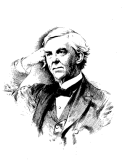Oliver Wendell Holmes - Biographical Sketch
by Oliver Wendell Holmes
Oliver Wendell Holmes was born at Cambridge, Massachusetts, August 29, 1809. The old house in which he was born, still standing near the colleges, has a historic interest as having been the head quarters of General Artemas Ward, and of the Committee of Safety in the days just before the Revolution. Upon the steps of the house stood President Langdon, of Harvard College, tradition says, and prayed for the men, who, halting there a few moments, marched forward under Colonel Prescott's lead to throw up in trenchments on Bunker Hill on the night of June 16, 1775. Dr. Holmes's father carried forward the traditions of the old house, for he was Rev. Dr. Abiel Holmes whose American Annals was the first careful record of American history written after the Revolution.
Born and bred in the midst of historic associations, Holmes had from the first a lively interest in American history and politics, and though possessed of strong humorous gifts, has often turned his song into patriotic channels, while the current of his literary life has been distinctly American.
He began to write poetry when in college at Cambridge, and some of his best-known early pieces, like Evening by a Tailor, The Meeting of the Dryads, The Spectre Pig, were contributed to the Collegian, an undergraduate journal, while he was studying law the year after his graduation. At this same time he wrote the well-known poem Old Ironsides, a protest against the proposed breaking up of the frigate Constitution; the poem was printed in the Boston Daily Advertiser, and its indignation and fervor carried it through the country and raised such a popular feeling that the ship was saved from an ignominious destruction. Holmes shortly gave up the study of law, went abroad to study medicine, and returned to take his degree at Harvard in 1836. At the same time he delivered a poem, Poetry, a Metrical Essay, before the Phi Beta Kappa Society of Harvard, and ever since his profession of medicine and his love of literature have received his united care and thought. In 1838 he was appointed Professor of Anatomy and Physiology at Dartmouth College, but remained there only a year or two, when he returned to Boston, married, and practised medicine. In 1847 he was made Parkman Professor of Anatomy and Physiology in the Medical School of Harvard College, a position which he retained until the close of 1882, when he retired, to devote himself more exclusively to literature.
In 1857, when the Atlantic Monthly was established, Professor Lowell, who was asked to be editor, consented on condition that Dr. Holmes should be a regular contributor. Dr. Holmes at that time was known as the author of a number of poems of grace, life, and wit, and he had published several professional papers and books, but his brilliancy as a talker gave him a strong local reputation, and Lowell shrewdly guessed that he would bring to the new magazine a singularly fresh and unusual power. He was right, for The Autocrat of the Breakfast-Table, beginning in the first number, unquestionably insured the Atlantic its early success. The readers of the day had forgotten that Holmes, twenty five years before, had begun a series with the same title in Buckingham's New England Magazine, a periodical of short life, so they did not at first understand why he should begin his first article, I was just going to say, when I was interrupted.
From that time Dr. Holmes was a frequent contributor to the magazine, and in it appeared successively, The Autocrat of the Breakfast Table, The Professor at the Breakfast-Table, Elsie Venner, The Professor's Story, The Guardian Angel, The Poet at the Breakfast-Table, -- prose papers, and stories with occasional insertion of verse; here also have been printed the many poems which he has so freely and happily written for festivals and public occasions, including the frequent poems at the yearly meetings of his college class. The wit and humor which have made his poetry so well known would never have given him his high rank had they not been associated with an admirable art which makes every word necessary and felicitous, and a generous nature which is quick to seize upon what touches a common life.
Source:
Grandmother's Story And Other PoemsCopyright 1888
Boston: Houghton, Mifflin and Company
